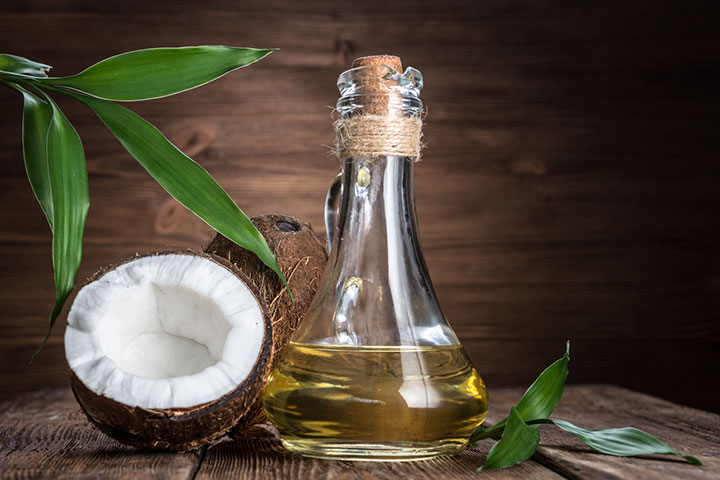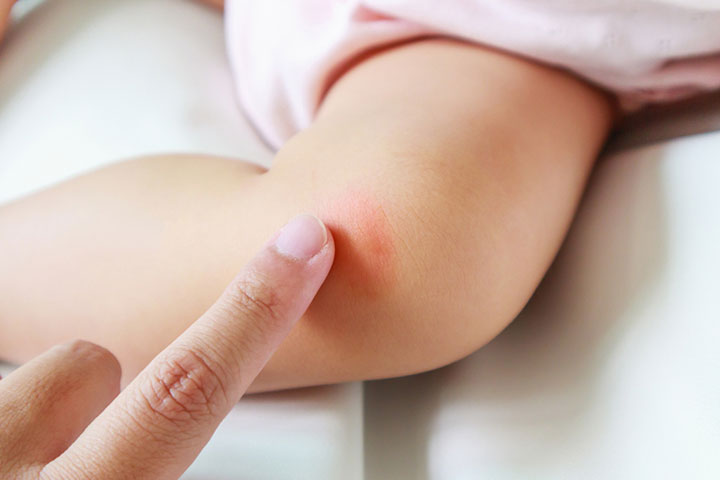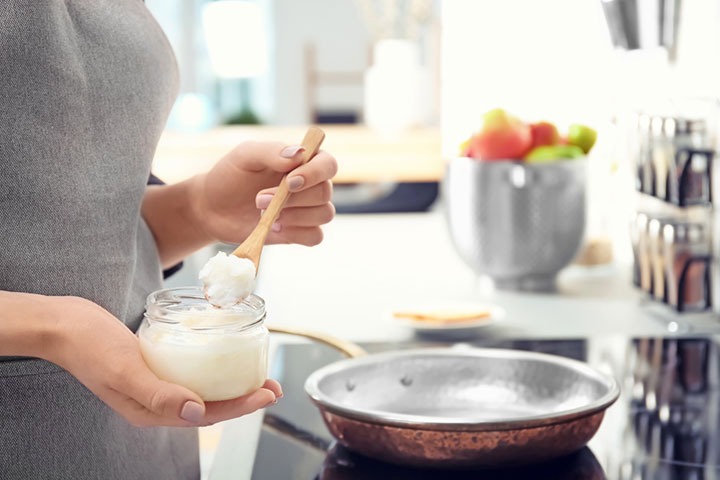Coconut oil is rich in medium-chain triglycerides (MCTs) that possess various medicinal and therapeutic properties. Perhaps that is why several parents consider trying coconut oil for babies for different purposes. Generally, this nutrient-rich oil is used as a healthy fats source in diets made for critically ill and premature infants (1).
However, its use for healthy babies is often limited to skin and hair care purposes. But if you want to add coconut oil to baby food recipes, consulting a pediatrician or certified nutritionist is crucial as the research on the safety and efficacy of coconut oil for infants and babies is limited. Also, as different types of coconut oils are available in the market, choosing the right oil type for your baby, specific to the intended use (topical or oral), is necessary for your little one’s safety.
Read on to know more about the coconut oil varieties considered safe for babies, the uses of coconut oil in different home remedies, and its side effects.
Varieties Of Coconut Oil
Coconut oil is derived from the fruit of the coconut tree. Read on to know about the three main variants of coconut oil and how they are extracted (2):
- Virginor unrefined coconut oil is extracted from the fruit of fresh and mature coconuts. Virgin oil is not refined or processed and is prepared without using high temperatures or chemicals.
- Refined coconut oil is made from copra (dried coconut kernel). This variety of oil is often refined through chemical bleaching and deodorization.
- Partially hydrogenated coconut oil is processed through partial hydrogenation, a process in which unsaturated fatty acids are converted into saturated ones. Due to this process, some of the unsaturated fats (the good fats) transform into trans fats (the bad fats).
Next, we look at how coconut oil is often used for babies.
Could not load the poll.
How Coconut Oil Might Help Babies
The molecular structure of coconut oil allows it to be easily absorbed by the skin, which makes it the preferred natural moisturizer in the tropical regions. The antioxidant, anti-inflammatory, and antimicrobialiXSubstance that kills microorganisms like fungi, bacteria, and viruses properties of coconut oil can help with some skin problems in babies. It is also used as an emollientiXMoisturizer that leaves a protective film on the skin to trap moisture in patients with atopic dermatitisiXRecurring dry, itchy rashes (3). However, the topical application of coconut oil in any form, for any skin condition, should be practiced after a thorough discussion with a pediatrician.
Next, we talk about a few skin conditions for which coconut oil is used as a remedy.
1. Cradle Cap
Cradle cap or dry scalp is a condition that affects several newborns during the initial weeks after birth. The condition is characterized by a flaky and reddened scalp, making it look like your little one has dandruff. So, incorporating coconut oil in your newborn care to massage their scalp, particularly on the area that is affected by cradle cap, may help alleviate the condition to an extent.
Let the oil stay on for 20 minutes or leave it overnight if necessary to break up the scale. Then, use a baby comb or hairbrush with soft bristles to brush off the flakes, and rinse your baby’s hair with lukewarm water.
2. Eczema
Eczema is a condition where the skin becomes very dry, and, as a result, there could be itching too. It is common in babies, as their skin is sensitive and can dry out quickly. According to a US Centers for Disease Control and Prevention (CDC) report, 10.4% of children between the ages of zero to five years were affected by eczema in 2021.
Experts consider the use of emollient therapy early on a novel approach to preventing atopic dermatitis
(4). An in-vitro study has shown that the topical application of virgin coconut oil could be effective in reducing eczema symptoms (3) (5). So, if your doctor recommends the use of coconut oil for eczema, then you could try massaging your baby with coconut oil once before or after bath time, and once at bedtime to provide adequate moisture and hydration to the skin. With regular coconut oil massage, your baby’s eczema symptoms might fade.
3. Diaper Rash
Diaper dermatitis, also known as diaper rash, is the most observed inflammatory skin concern in infants and toddlers. A study on 117 patients diagnosed with mild to moderate atopic dermatitis found that topical application of virgin coconut oil for eight weeks was more effective than the application of mineral oil in relieving the symptoms of atopic dermatitis (6).
If your doctor approves the use of coconut oil for diaper rash, you could apply it in the diaper region and see if it helps. Apply a layer of coconut oil on the areas covered by diaper each day after bath and then at every diaper change. Be sure to massage in the groin area, and especially in the skin folds where the rash first appears. The emollient properties of coconut oil will help treat the diaper rash, and the antibacterial properties will prevent any further occurrence of the same.
4. Hair Care
A paper published in The Journal of Cosmetic Science presented that both the in-vivo and in-vitro treatments using coconut oil prevented combing damage of various hair types. The study further presented that coconut oil has considerable amounts of lauric acid.
Lauric acid has a high affinity for hair proteins, and due to its low molecular weight and peculiar structure, it can penetrate inside the hair shaft (7). Thus, coconut oil can be considered an option while you plan a hair care regimen for your baby.
To use, wet your baby’s hair during bath time and apply a small amount of coconut oil evenly onto the hair. Alternatively, you can also massage coconut oil on the baby’s hair at night and wash it off in the morning.
5. Dry And Chapped Lips
Babies have sensitive skin that can be affected by temperature. As your baby’s skin stands the risk of getting dried out faster than yours, there is also the chance of your baby’s lips turning dry and as a result, chapped. Chapped and dry lips can be a thorny problem for your little one, especially as they make it difficult for your baby to breastfeed.
Also, your baby may constantly try to lick the lips to ease the pain, which can make the lips further dry. Applying coconut oil might help reduce the dryness of lips. To do so, take a clean and sterilized Q-tip, dip it in a little amount of coconut oil, and apply the oil on your baby’s lips as well as around the area of the lips. Make sure you do not apply any pressure as it can lead to pain and cause more discomfort.
6. Insect Bites
A research study also showed that coconut oil has fatty acids that have potential insect repellent properties to keep away bed bugs, horn flies, and stable flies (8). Apart from this, the inflammatory and emollient properties of coconut oil might provide some relief from soreness caused due to insect bites. If your pediatrician allows, you can try coconut oil as a remedy for insect bites.
Take some coconut oil and rub it between your palms to warm it up. Now apply it gently on your baby’s skin where the insect bite is. Make sure you do not rub down hard as it may cause more pain and discomfort to your baby. Leave it on till your baby’s next bath.
7. Homemade Baby Wash
It is always a challenge to find the right baby wash that will help to clean your baby’s skin but not make it dry. Most baby washes contain some chemicals that can show adverse effects on your baby’s skin. You may not be aware of all the ingredients that your baby is allergic too. So, using a baby wash, even of a reputed baby care brand, might carry a risk of an allergic reaction.
You can avoid that by making a homemade baby wash using coconut oil. To prepare the body wash, take equal amounts of coconut oil and castor oil or castile soap, and mix them well together. Apply it all over your baby’s body and face at bath time. Gently massage to take out any dirt and wash off with regular bathwater.
Pediatric consultation is a must if you want to use coconut oil as a body wash. This is crucial as the safety and efficacy of co-ingredients such as castor oil and castile soap need to be checked before use.
8. Lice
Head lice infestations are pesky, communicable problems. Many people try coconut oil as an effective remedy, but the studies proving its efficacy are sparse. You can, however, try a home remedy made of coconut oil to try and fight lice infestations.
Use a little apple cider vinegar (ACV) to rinse out your baby’s hair. Let it stay in the hair till it dries out naturally. Once the vinegar becomes dry, apply coconut oil to the baby’s hair and make sure that you cover all hair. If possible, cover your baby’s head with a shower cap. If that is not possible, and your baby tries to take out the shower cap, let the coconut oil stay in the hair for as long as possible.
Since this remedy involves the use of ACV, check about its safety, and recommended usage with your pediatrician before you try it.
9. Baby Acne
As babies have sensitive skin, they can easily suffer breakouts that can cause red marks on the skin that may be swollen or itchy. Since coconut oil has anti-inflammatory and skin barrier repairing properties, you may try it to get some relief from acne (1) (3). However, there are no clinical studies to prove the efficacy of coconut oil use for acne. The practice is mostly anecdotal.
10. Baby’s Thrush (Candida)
Thrush or Candida is a common oral fungal infection in babies. Its symptoms include white, oddly shaped patches in the mouth. It can’t be washed away or wiped off easily, like milk curds (9).
Traditionally, the use of coconut oil is considered to provide relief from fungal infections due to its antifungal properties (10). Some studies have also documented the sporostaticiXReversible inhibition of spore germination properties of coconut oil after heating or boiling (11). However, all these studies have not recommended the use of coconut oil for any specific fungal infection. Also, the safety and efficacy of oral use of coconut oil for babies to treat thrush are not well-documented.
11. Baby Toothpaste
The use of coconut oil in oil pulling among adults to maintain oral health by reducing plaque formation is well-documented in alternative medicine literature. However, its use is not recommended by the American Dental Association (12). The use of coconut oil as toothpaste or any other oral use for babies is under-researched. You may consult your pediatrician for its use.
12. Teething Pain
The American Academy of Pediatrics advises massaging the gums while teething. However, the use of any oil for the same is not mentioned (13). However, the use of coconut oil for relieving teething pain is well-documented in alternative medicine due to its anti-inflammatory properties.
Autumn, a mother with a son named Jayce, writes in her blog about various ways she uses coconut oil, and how she utilized it to help soothe her son’s teething discomfort. She says, “My little one is teething, and I use coconut oil as an anti-inflammatory on his gums (i).”
13. Frizzy Hair
While your baby’s hair will otherwise be soft to touch, being in constant friction with the pillow or the surface on the bed could make them frizzy at certain parts. During the early weeks after birth, moisture loss could also be one of the reasons for your baby to get frizzy hair.
For a long time, coconut oil has been considered effective. It is believed to condition hair, which makes them soft and smooth. Although there are no direct studies to relate the use of coconut oil to defrizz hair, the presence of high amounts of lauric acid in the oil could be the reason. Lauric acid can penetrate the hair shaft and provide nourishment (7).
14. Chest Rub For Cold
Having a cold can make it difficult for your baby to breathe and may even cause interference in your baby’s feeding schedule. If left untreated, a cold can escalate to a fever. Thus, using a chest rub during a cold can help to decongest the nose and the chest area, and aid in treatment for cold.
Autumn adds, “I make a chest rub that’s safe and natural that I use on Jayce when he’s sick. It works great to get rid of colds.”
In many traditional practices, coconut oil is combined with camphor or garlic and used as a chest rub to provide relief from cold. But these practices are anecdotal, and research backing their efficacy is not well documented. However, with proper pediatric guidance, you can try this home remedy.
Take two teaspoons of any essential oil, such as eucalyptus oil. Add a few tablespoons of coconut oil to the essential oil and mix. Warm up the oil by taking it in your palm and rubbing it till the friction in your hand makes it warm. Now rub it on your baby’s chest as a natural and safe alternative to a cosmetic chest rub.
Note that essential oils may not be safe for the baby, but when highly diluted and used as prescribed by the doctor, you may use them. In any case, consult a pediatrician before using essential oils for babies.
15. Coconut Oil as Body Lotion
Coconut oil has emollient and antimicrobial properties, owing to which it is considered suitable for use in a skincare regimen (1) (3). Take a little coconut oil in your palms and dab it on the areas you wish to moisturize. Leave it until the next bath.
16. Coconut Oil for Baby Massage
Most parents are aware of the benefits of baby massage. Using coconut oil for the same has proven its efficacy too (14). A traditional way to use coconut oil for baby massage is to take equal amounts of extra virgin coconut oil and olive oil and mix them thoroughly. To the mix, add a few drops of natural essential oil like lavender and use the same to massage your baby.
17. Remove Meconium
Coconut oil works suitably when it comes to the removal of meconium, a tar-like viscous substance that comes out through the baby’s bowel. You can use coconut oil and rub it over meconium to help it get-off the baby’s delicate skin.
18. Coconut Oil in Food
Breastfeeding mothers can use coconut oil in cooking or consume it in some other way. Consumption of coconut oil is believed to increase the milk flow.
The presence of medium-chain triglyceridesiXFatty acids found in coconut and palm oil, and dairy products, that the body easily absorb such as lauric acid is beneficial for mothers as well as their babies. It also aids in developing the immune system and helps in the overall growth and development of the baby (15). It could also help babies absorb nutrients from vegetables like pumpkin, leafy greens, carrots, and squash as they start solids.
Virgin coconut oil is hypoallergeniciXLess prone to cause allergic reactions. However, it has shown cross-reactivity in people who have a tree nut allergy (16). So even though it is considered safe, make sure you speak to a pediatrician before your baby ingests it.
19. Coconut Oil for Bumps, Burns and Cuts
A study conducted on rats showed that topical application of virgin coconut oil could help in speeding up wound healing. Virgin coconut oil has antimicrobial properties and some other bioactive compounds that may help in healing (10) (7). However, it is advisable to seek medical advice before proceeding with the home remedies.
20. Yeast Infection in Babies
Using coconut oil might help in addressing yeast infections, as it could weaken the bad bacteria (1) (7). The antifungal and antibacterial properties of coconut oil can prevent skin infections. However, it should be used under pediatric guidance only.
21. Soft Spot
Traditionally, it is believed that massaging with coconut oil can harden soft spots in babies. These soft spots, which are known as fontanelles, are normal gaps in a neonate’s skull that allow your baby’s brain to grow rapidly in the first year of life (17). The use of coconut oil to massage the baby’s head to harden the soft spot is anecdotal. There are no specific studies to support this belief. So, consult a pediatrician if you are planning to use coconut oil to massage your baby’s head.
Coconut oil is usually safe to use topically but may not suit all when administered orally.
Could not load the poll.
Side-Effects Of Using Coconut Oil
Although rare, coconut oil can be allergic. Coconut allergy, if present, can be both topical and oral. There are some cases in which people with a tree nut or hazelnut allergy may be allergic to coconuts as well. This phenomenon is called cross-reactivity (18).
Dr. Cameron Rokhsar, a New York-based board-certified dermatologist, says, “Virgin coconut oil can be safe to use on babies in certain situations. However, it’s important to ensure that the oil is organic and contains no added ingredients. This can help minimize the potential risks of using coconut oil on sensitive baby skin. In addition, it’s important to be mindful of potential allergies. If you notice any adverse reactions or changes in your baby’s skin after using coconut oil, it’s important to stop and consult a pediatrician or dermatologist.”
Next, we answer a few commonly asked questions about coconut oil use for babies.
Coconut oil is known for its therapeutic and aromatic properties. It has popularly been used for massaging, prevention of dry scalp, etc. However, just like any other product, if you are considering coconut oil for babies, you should first consult your pediatrician. Although applying the oil topically on babies does provide some health benefits, such as preventing diaper rash, dried scalp, and healing infections, a baby’s skin is sensitive and may react differently. So, whether topical or oral, ask your child’s doctor about its safety and opt for the best quality ones.
Key Pointers
- Coconut oil has a high level of medium-chain triglycerides, which have medicinal and therapeutic qualities.
- Baby skin and hair can be cared for with coconut oil. However, it is advised to speak with a pediatrician before using it in baby food.
- With its anti-inflammatory, antibacterial, and antioxidant characteristics, coconut oil can treat various skin conditions in infants, including cradle cap, eczema, diaper rash, dry lips, insect bites, and acne.
- Additionally, coconut oil can be used as a body lotion, to remove meconium, treat rashes, burns, scrapes, and thrush, and ease teething pain.















